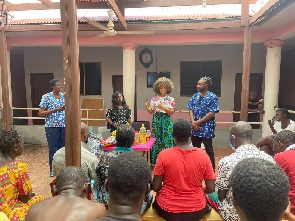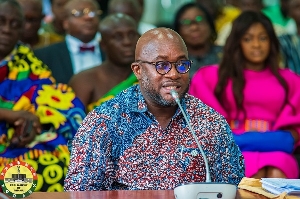Opinions of Monday, 3 April 2023
Columnist: Lawrence Owusu Fianko
Addressing mental health and addiction challenges in Ghana: Reflections from a Ghanaian therapist
As Kerry Washington said in her HuffPost interview, 'The stigma associated with mental illness should be removed. My brain and my heart are important to me. I don't know why I wouldn't seek help to have those things be as healthy as my teeth.' This quote resonates with me as a Ghanaian American therapist and founder of Limelight Recovery, USA, a private practice that offers a wide range of mental health and substance use services to individuals, families, and groups who are motivated for positive change via tele-health services, focusing on marginalized populations who lack access to affordable, quality mental health treatment.
In addition to my work with Limelight Recovery, I am also a co-founder and CEO of Educational Communities Worldwide, a non-profit organization that unlocks the potential for under-resourced students to become impactful global leaders through access to holistic educational opportunities, resources, and community development. The team, consisting of President Veronica Owusu, Chief Financial Officer Joseph Hamelo, and Strategic Assistant Lucy Onovwa, visited the Willing Way Foundation Rehab Center in Kumasi, Ghana as part of their charitable outreach efforts, and were greeted by Ms. Lydia Abena Manu, the center's Founder and Addiction Therapist.
As a Ghanaian American, mental health and addictions therapist practicing in the USA, my visit to the Willing Way Foundation Rehab Center in Ghana was particularly meaningful to me. It was a reminder of the unique challenges faced by those struggling with addiction and mental health issues in Ghana, as well as the resilience and strength of the Ghanaian people.
The level of care and expertise demonstrated by the Willing Way Foundation team during my visit was truly remarkable, especially given the limited resources available to them. This experience further solidified my belief that access to mental health support should be available to all, regardless of their financial situation.
It was clear to me that the Willing Way Foundation is making a substantial impact in the lives of those they serve, despite the resource constraints they face. Their team provides invaluable support and guidance to help individuals overcome their challenges and achieve sustainable recovery. The Willing Way Foundation’s work is essential in addressing the mental health crisis in Ghana, and I was impressed by their dedication and resilience in the face of adversity.
It is clear that more needs to be done to address this pressing issue. I understand the cultural nuances and unique challenges that individuals from Ghana may face when seeking mental health support. This is why I strongly believe that increasing awareness and education around addiction and mental health in Ghana is crucial.
By providing education on mental health issues and breaking down the stigma surrounding them, we can encourage more people to seek help and support. It is also important to recognize that there may be cultural factors that influence how mental health is perceived and addressed in Ghana. Therefore, it is essential to engage with local communities and work towards culturally responsive approaches to mental health care.
I urge the Ghanaian government to provide additional support and resources to organizations like the Willing Way Foundation, so they can continue their vital work and reach more people in need. With increased support, we can make meaningful progress in tackling addiction and mental health challenges and improve the lives of countless individuals and families in Ghana.
I also want to emphasize the importance of building partnerships between mental health professionals in Ghana and those in other parts of the world, including the United States. This can facilitate knowledge sharing, training, and the exchange of resources, ultimately leading to improved outcomes for those seeking mental health supports in Ghana.
Furthermore, it is essential to involve individuals with lived experience in the design and implementation of mental health policies and programs in Ghana. By centering the experiences and needs of those directly impacted, we can develop more effective and culturally responsive approaches to mental health care.
I urge individuals and organizations to support the Willing Way Foundation and other similar organizations in Ghana through volunteering and donations. Even small contributions can make a significant difference in providing much-needed resources to those struggling with addiction and mental health issues.
In conclusion, we must work towards building a comprehensive system of mental health care in Ghana that is accessible to everyone, regardless of his or her economic background. By increasing awareness, breaking down stigma, and supporting organizations like the Willing Way Foundation, we can make significant strides towards improving mental health outcomes for individuals and families in Ghana.













